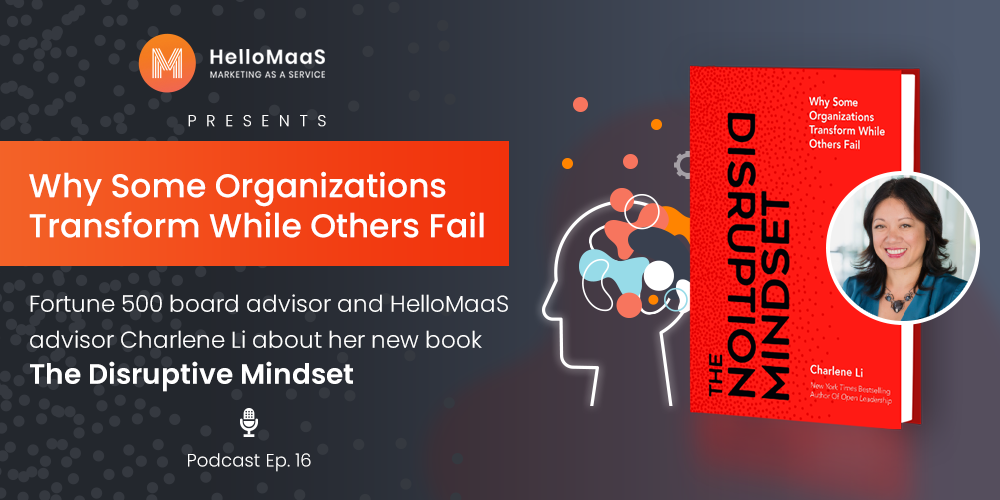Podcast: The Disruptive Mindset

Charlene Li over haar nieuwste boek, transformatie en innovatie
Bijna elk bedrijf is op een of andere manier bezig van digitale transformatie, maar hoeveel levert het op? Het antwoord: verrassend weinig. Nieuw onderzoek van Bain & Company toont aan dat slechts 8 procent van de bedrijven hun beoogde bedrijfsresultaten bereiken. Charlene Li, adviseur van Fortune 500 én HelloMaaS, vertelt in deze podcast over disruptie, transformatie en haar nieuwe boek ‘The Disruptive Mindset’.
Vandaag praten we met Fortune 500 board room consultant, keynote speaker (van WEF in Davos tot TED-talks) en * drumroll * HelloMaaS-adviseur Charlene Li uit San Francisco. Li is zesvoudig New York Times bestsellerauteur, waar ook haar nieuwste boek toe behoort: ‘The Disruption Mindset: Why some Businesses Transform and other Fail’.

Ik hoorde voor het eerst over Li in 2008 op de SXSW-conferentie in Austin, waar ze haar bestseller boek ‘Groundswell’ publiceerde. Zij was en blijft een grote inspiratie. Haar framework heb ik veelvuldig ingezet voor het management-advieswerk dat ik destijds deed met Philips in Amsterdam, gevolgd door Samsung en hun wereldwijde marketingteam in Korea.
Ik had het grote voorrecht om rechtstreeks met Li te werken toen ik een paar jaar later leiding gaf aan social media bij JPMorganChase in New York. Charlene en ik werkten samen met de C-suite van de bank aan digitale transformatie.
Innovatie en transformatie
“To be competitive, it’s no longer enough to be innovative – you must have a strategy for disruptive growth, a plan to identify and seize an opportunity no one else has the audacity or confidence to reach for.” Het roept de vraag op wat een bedrijf nodig heeft om disruptief te zijn. Wat voor soort structuren, cultuur en team heeft een bedrijf nodig om dit mogelijk te maken?
“I can usually tell if innovation or transformation is happening. It’s when people look really distressed”
“Disruptive organizations of any size have three beliefs that drive them: openness (speed and access of information); agency and bias for action.” Opvallend is dat organisaties best weten wat nodig is en de voordelen zien, maar dat ze nog steeds niet achter de kansen aan gaan: “Most organizations know what to do, and still choose not to go into it because the implications are just too disruptive for them to handle.”
Kom meer te weten over Charlene Li en kom met haar in contact via HelloMaas.
De podcast is ook via iTunes en Spotify te beluisteren.
Wij begrijpen dat je soms kortstondig specifieke kennis nodig hebt. Benieuwd hoe jij jouw in-house marketing team op een flexibele manier kunt opzetten? Op HelloMaaS kun je direct connecten met marketing freelancers. Meer weten? Klik hier.
Topics
[00:00:00] Intro HelloMasters
[00:00:30] Introductie Louise Doorn
[00:00:50] Quote uit Charlene’s boek
Growth is painful. Change is painful. But nothing is as painful as staying stuck where you don’t belong
[00:02:20] Introductie Charlene Li
[00:03:40] Wat drijft Charlene Li?
[00:04:00] Meest trots op…
Writing my first book. There’s nothing like the first one
[00:05:10] Zijn boeken nog het beste medium om een boodschap over te brengen?
I don’t think of it as just as a book. It’s one artifact. Books are proven to be very resilient. People still love to have them
Why should we force people to learn and absorb new ideas in only one format?
It was the process of writing the book that got all my ideas on paper
[00:07:00] Onderzoeksmethoden
[00:08:50] De juiste mensen aan tafel
I tend to talk to the top leaders, because they can give you the full spectrum
Often we think about the digital part of digital transformation, and kind of assume that the transformation part will just take care of itself
[00:10:40] Modus operandi
Having outside expertise is extremely helpful. But to wholesale outsource it to someone else is a huge mistake
The places where I see this has worked, is where it’s driven from the top ánd the bottom
We have shrunk the power distance inside an organisation, which makes it easier to align entire organisations against a common objective
[00:12:20] Welke industrieën komen aan bod in jouw onderzoek?
I wanted to get as many perspectives as possible
I didn’t want to learn from the usual suspects – Google, Uber – because people think ‘I can’t be like them’
I wanted to look at organizations that the rest of us can relate to
[00:14:30] Samenvatting van haar onderzoek
It’s not disruption that creates growth, it’s growth that is disruptive
Most organizations know what to do, and still choose not to go into it because the implications are just too disruptive for them to handle
What can get people excited and aligned is a simple thing that disruptive companies do really well: the focus on future customers
The companies who have a clear idea who that customer is, will make the hard decisions today to chase after that customer of tomorrow
[00:16:30] Startups versus corporates: operating models
Disruptive organizations of any size have three beliefs that drive them: openness (speed and access of information), agency, and bias for action
Startups can only focus on future customers, because they have no current customers
[00:20:10] Mythes in transformatie
Growth begins at the end of your comfort zone. If you want this to be comfortable, it’s not. It’s called transformation and disruptive for a reason
[00:22:00] Vereiste mindset
You may want to just push the easy button […] But transformation requires a huge amount of change
[00:25:40] Bedrijven die falen met transformatie
[00:27:45] Welke mentaliteit is nodig?
Leadership is all about creating change. If you’re not creating change you’re not a leader, you’re a manager
Movement are important because you’re about to go on a journey that is very difficult
[00:32:10] Chief Digital Officer?
CDO’s are very helpful. But another good model is when everybody is a part of it through distributed leadership. That’s the best solution
The problem with a CDO is that other C-suites will brush of their responsibilities to him/her
I can usually tell if innovation or transformation is happening. It’s when people look really distressed
[00:37:00] Ombouwen van traditioneel leiderschap
You can work from anywhere and have a highly distributed team. However, it is a lot of easier if everyone in the same place
You have to work extra hard to get that cultural component when you’re working with a remote team. We usually get those from the soft skills of working together
Shared experiences are key to build your culture. Stories that you tell each other, videos that you share
[00:41:10] Gebruik van technologie
How do you live in a world of chaos and flux?